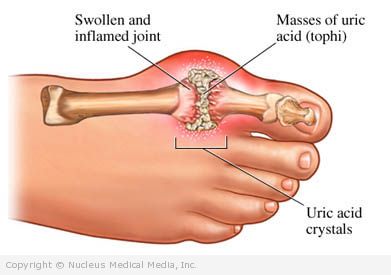(Arthritis, Gouty; Gouty Arthritis)
Gout – Definition
Gout happens when uric acid crystals build up in the joints. This causes the joints to be inflamed. If the crystals build up in the kidneys, kidney stones may result.
Gout – Causes
Gout typically occurs if you have high levels of uric acid in your blood (called hyperuricemia). But, you could also have normal uric levels and still have gout.
The liver metabolizes uric acid, and the kidneys get rid of it through the urine. Levels of uric acid build up when:
- Too much uric acid is produced
- Not enough uric acid is eliminated
If you have gout and hyperuricemia, your body doesn’t eliminate enough uric acid.
Gout – Risk Factors
These factors increase your chance of developing gout. All causes of hyperuricemia are risk factors for gout.
Risk factors include:
- Obesity, sudden weight gain, or rapid weight loss
- Age: over 40 years old
- Sex: male
- Family members with gout
- Diuretics, such as hydrochlorothiazide
- Certain medications, such as aspirin
- High-purine diet (uric acid occurs when purines are broken down), for example:
- Liver and other organ meats
- Dried beans and peas
- Anchovies
- Gravies
- Diet that includes high-fructose drinks, like sugar-sweetened sodas and orange juice
- Alcohol use, especially binge drinking
- Certain types of cancer or cancer treatments (eg, cytotoxic drugs)
- Medications (eg, antiseizure, anti-rejection medications)
- Dehydration
- Hypercholesterolemia
- Kidney disease
Gout – Symptoms
Symptoms include:
Acute Gouty Arthritis
- Sudden onset of severe pain in an inflamed joint, usually starting in the big toe
- Joints that are red, hot, swollen, and very tender
- Increased pain 24-36 hours after the onset of symptoms
Recurrent Gouty Arthritis
Most people with gout have another attack within two years. This attack may affect many different joints. With recurrent gout, tophi can form. Tophi are chalky deposits of uric acid that commonly occur in the elbows and earlobes.
Gout – Diagnosis
The doctor will ask about your symptoms and medical history, and perform a physical exam. A sample of fluid from the affected joint will be taken. This fluid will be tested for uric acid crystals.
Other tests may include:
- Blood and urine tests — to measure the level of uric acid in your blood and to assess kidney function
- X-ray — a test that uses radiation to take a picture of structures inside the body, especially bones; used to check for joint destruction
Gout – Treatment
Treatment depends on whether the gout is acute or recurrent.
Acute Gouty Arthritis
In general, the sooner treatment begins for an acute attack, the more effective it is. Treatment depends on:
- Onset of symptoms
- Number of joints affected
- Previous responses to treatment
- Overall health
General Measures
Putting a warm pad or an ice pack on the joint may ease the pain. Keeping the weight of clothes or bed covers off the joint can also help.
Medications
- Nonsteroidal anti-inflammatory drugs (NSAIDs), for example:
- Indomethacin
- Ibuprofen
- Naproxen
- Corticosteroids — used if NSAIDs are not effective or not recommended
- A study found that people given corticosteroid plus acetaminophen had fewer adverse affects than those given NSAID plus acetaminophen.
- Colchicine — used to prevent gout attacks, but seldom used as a treatment for an acute attack
- Note : This drug has many adverse effects, so it is rarely used first.
Recurrent Gout
General Measures
- Consume a low-purine diet.
- Avoid alcohol.
- If you’re overweight, lose weight gradually. Rapid weight loss can cause a gout attack.
- Ask your doctor if any of your medications cause high uric acid levels.
- Drink a lot of fluids.
Medications
If you have recurrent gouty arthritis or an initial attack with hyperuricemia, you may be given medication:
- To lower the production of uric acid (eg, allopurinol)
- To increase the excretion of uric acid by the kidneys (eg, probenecid or sulfinpyrazone)
In some cases, low-dose colchicine may also be used to prevent recurrent attacks.
If you are diagnosed with gout, follow your doctor’s instructions.
Gout – Prevention
To reduce your chance of getting gout:
- Eat a low-purine diet.
- Limit how much alcohol you drink. Avoid binge drinking.
- Drink a lot of fluids.
- Lose weight gradually.
- Talk to your doctor about your risk for high blood pressure and heart attacks. These conditions are associated with gout.

